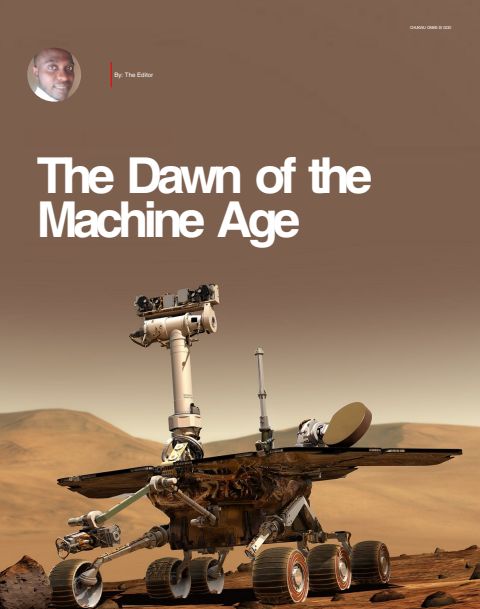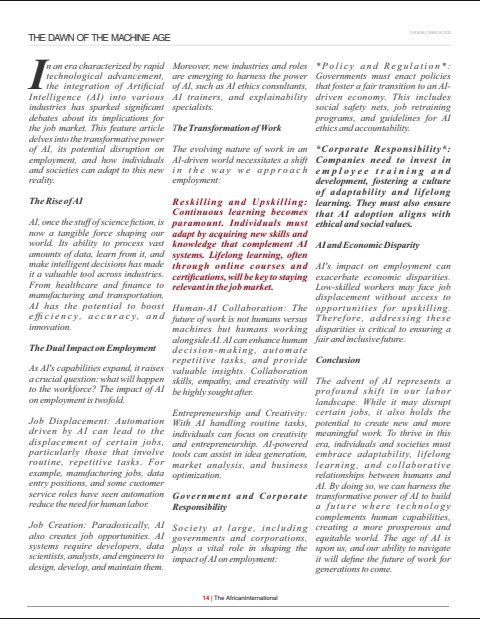By Ollus Ndomu

The Dawn of the Machine Age-The African International Magazine
In an era characterized by rapid technological advancement, the integration of Artificial Intelligence (AI) into various industries has sparked significant debates about its implications for the job market. This feature article delves into the transformative power of AI, its potential disruption on employment, and how individuals and societies can adapt to this new reality.
The Rise of AI
AI, once the stuff of science fiction, is now a tangible force shaping our world. Its ability to process vast amounts of data, learn from it, and make intelligent decisions has made it a valuable tool across industries. From healthcare and finance to manufacturing and transportation, AI has the potential to boost efficiency, accuracy, and innovation.
The Dual Impact on Employment
As AI’s capabilities expand, it raises a crucial question: what will happen to the workforce? The impact of AI on employment is twofold.
Job Displacement: Automation driven by AI can lead to the displacement of certain jobs, particularly those that involve routine, repetitive tasks. For example, manufacturing jobs, data entry positions, and some customer service roles have seen automation reduce the need for human labor.
Job Creation: Paradoxically, AI also creates job opportunities. AI systems require developers, data scientists, analysts, and engineers to design, develop, and maintain them. Moreover, new industries and roles are emerging to harness the power of AI, such as AI ethics consultants, AI trainers, and explainability specialists.
The Transformation of Work
The evolving nature of work in an AI-driven world necessitates a shift in the way we approach employment:
Reskilling and Upskilling: Continuous learning becomes paramount. Individuals must adapt by acquiring new skills and knowledge that complement AI systems. Lifelong learning, often through online courses and certifications, will be key to staying relevant in the job market.
Human-AI Collaboration: The future of work is not humans versus machines but humans working alongside AI. AI can enhance human decision-making, automate repetitive tasks, and provide valuable insights. Collaboration skills, empathy, and creativity will be highly sought after.
Entrepreneurship and Creativity: With AI handling routine tasks, individuals can focus on creativity and entrepreneurship. AI-powered tools can assist in idea generation, market analysis, and business optimization.
Government and Corporate Responsibility
Society at large, including governments and corporations, plays a vital role in shaping the impact of AI on employment:
*Policy and Regulation*: Governments must enact policies that foster a fair transition to an AI-driven economy. This includes social safety nets, job retraining programs, and guidelines for AI ethics and accountability.
*Corporate Responsibility*: Companies need to invest in employee training and development, fostering a culture of adaptability and lifelong learning. They must also ensure that AI adoption aligns with ethical and social values.
AI and Economic Disparity
AI’s impact on employment can exacerbate economic disparities. Low-skilled workers may face job displacement without access to opportunities for upskilling. Therefore, addressing these disparities is critical to ensuring a fair and inclusive future.
Conclusion
The advent of AI represents a profound shift in our labor landscape. While it may disrupt certain jobs, it also holds the potential to create new and more meaningful work. To thrive in this era, individuals and societies must embrace adaptability, lifelong learning, and collaborative relationships between humans and AI. By doing so, we can harness the transformative power of AI to build a future where technology complements human capabilities, creating a more prosperous and equitable world. The age of AI is upon us, and our ability to navigate it will define the future of work for generations to come.

The Dawn of the Machine Age-The African International Magazine

